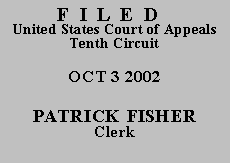

| In re:
YOLETTE MARIE PRATT , |
No. 02-4045
(D.C. No. 2:01-CV-908-C) (D. Utah) |
On October 24, 2001, Pratt objected to the bifurcation and dismissal at a hearing before U.S. Bankruptcy Court Judge Judith A. Boulden. (Id. at 8995.) At the hearing, Pratt claimed that she thought she could not bring children to the creditors' meeting and, consequently, her duties as a mother of four young children, including a nursing infant, prevented her from attending. (Id. at 9192.) Pratt also explained that she lacked adequate transportation to attend the meeting, which was held more than 40 miles from her home. (Id.; Aplt. B. at 12.) After observing to Pratt's attorney that "[i]f there is some enormous impediment to the debtor attending you could have filed a motion to excuse," Judge Boulden overruled the objection and entered an order dismissing Pratt's case on November 1, 2001. (Aplt. App. at 61, 93.)
Pratt failed to appeal Judge Boulden's order of dismissal within 10 days, but on November 14, 2001 she petitioned the United States District Court for the District of Utah for a writ of mandamus. (Id. at 64.) In her petition, Pratt argued that it was an "abuse of power" for Judge Boulden to dismiss her case, and she sought both to have Judge Boulden's order of dismissal vacated and to have the bankruptcy court ordered to adopt and submit to the district court for approval "a more equitable local rule containing clear standards for excusing debtors for their failure to attend meetings of creditors." (Id. at 6467, 102.)
On January 31, 2002, the district court denied Pratt's petition for a writ of mandamus, and Pratt now appeals the district court's decision. For substantially the reasons given by the district court, we AFFIRM the district court's denial of a writ of mandamus.
ENTERED FOR THE COURT
David M. Ebel
Circuit Judge
*.After examining appellant's brief and the appellate record, this panel has determined unanimously that oral argument would not materially assist the determination of this appeal. See Fed. R. App. P. 34(a)(2) and 10th Cir. R. 34.1(G). The case is therefore ordered submitted without oral argument. This Order and Judgment is not binding precedent, except under the doctrines of law of the case, res judicata, and collateral estoppel. The court generally disfavors the citation of orders and judgments; nevertheless, an order and judgment may be cited under the terms and conditions of 10th Cir. R. 36.3.
1.Rule 2003-1(a) reads in part: "The debtor and the debtor's attorney are required to appear at any properly scheduled or continued meeting of creditors. Failure of a debtor or a debtor's attorney to appear shall result in a voluntary case being dismissed. In a joint case where only one spouse appears, the case shall be bifurcated and the appropriate dismissal entered."